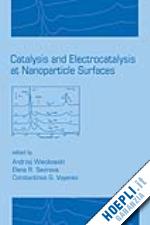Theory of nanoparticle catalysis and electrocatalysis: theory and modelling of catalytic and electrocatalytic reactions - some selected examples; simulations of the reaction kinetics on nm supported catalyst particles; electronic structure and chemisorption properties of supported metal clusters - model calculations. Model systems - from single crystals to nanoparticles: state-of-the-art characterization of single crystal surfaces; single crystal surfaces as model platinum-based fuell cell electrocatalysts; electrochemical nanostructuring of surfaces; adsorption and reaction at supported model catalysts; size-dependent electronic, structural, and catalytic properties of metal clusters supported on ultra-thin oxide films; physical and electrochemical characterization of bimetallic nanoparticle electrodes. Synthetic approaches in nanoparticle catalysis and electrocatalysis: nanomaterials as precursors for electrocatalysts; preparation, characterization, and properties of bimetallic nanoparticles; physicochemical aspects of preparation of carbon supported Nobel metal catalysis. Advanced experimental concepts: NMR investigation of supported metal catalysts; in situ X-ray adsorption spectroscopy investigations of the carbon-supported pt electrocatalysts; STM and infrared spectroscopy in studies of fuel cell model catalysts. Particle size, support, and promotional effects: electrochemical and chemical promotion on metal films and nanoparticles; metal-supported interaction in low temperature fuel cell electrocatalysis; effects of nanoparticle size, structure, and metal-support interactions; promotion, electrochemical promotion and metal-support interactions; support effects on catalytic performance of nanoparticles; abnormal infrared effects of nanometer scale thins film material of platinum group metals and alloys at electrode/electrolyte interfaces; design of electrocatalysts for fuel cells; effect of particle size and support on some catalytic properties of metallic and











